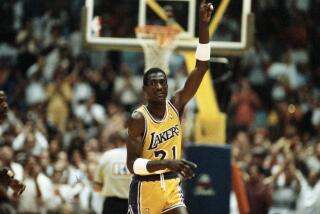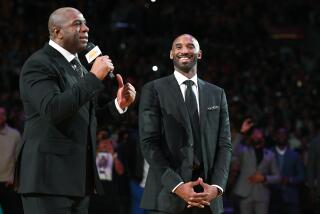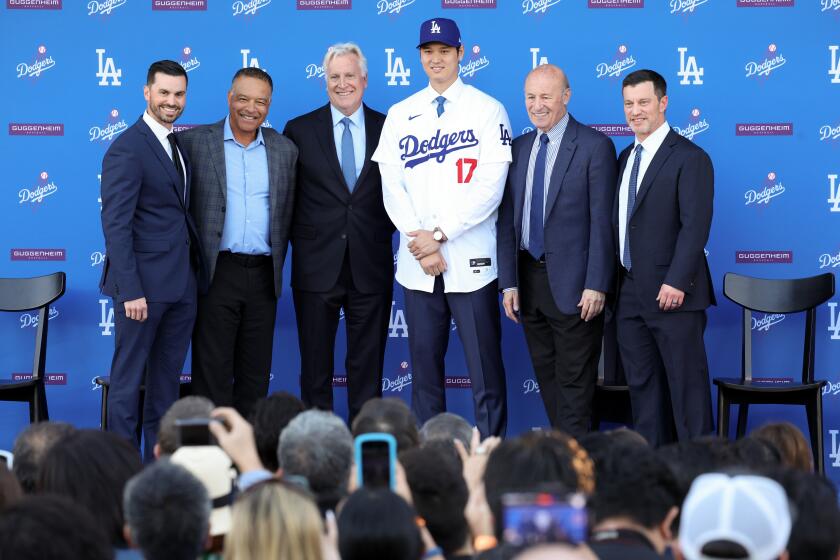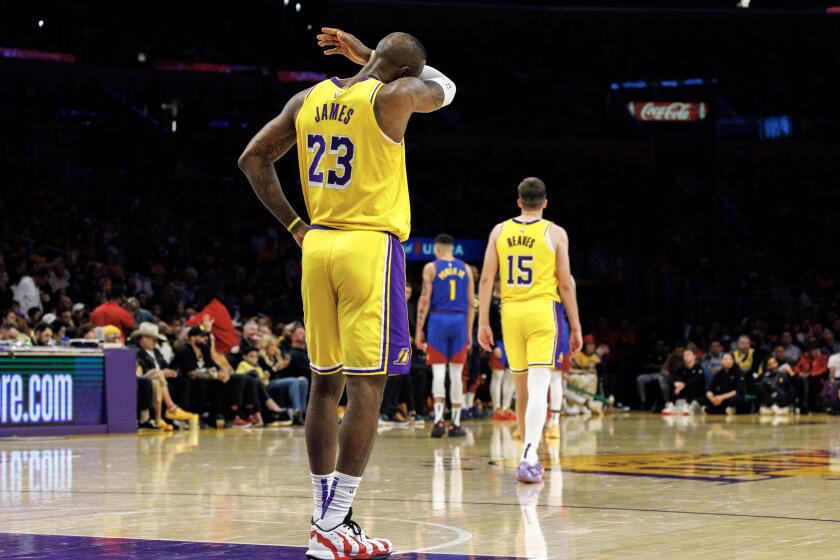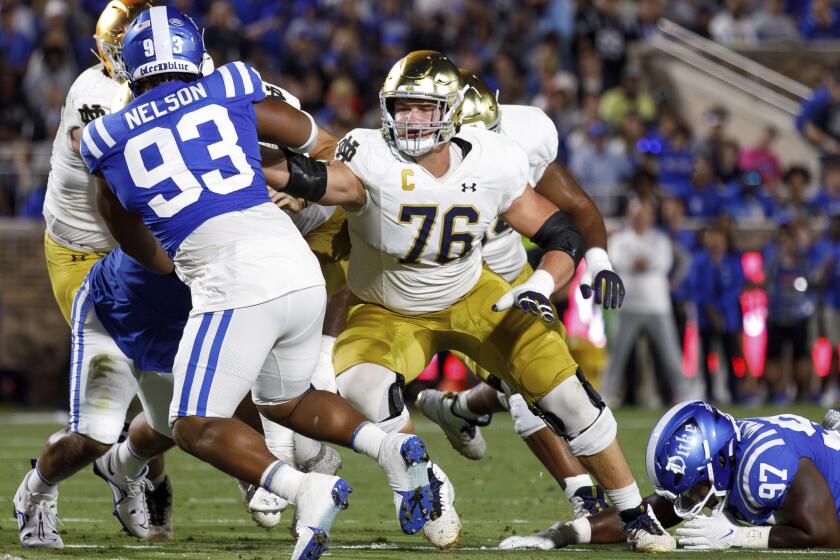It’s Earvin in business world, but touch is still Magic
Magic Johnson’s purchase of part ownership of the Dodgers is the latest step in one of the most successful postgame careers of any professional athlete.
The former Lakers guard has carved out a role as a liaison between big-money investors and the residents of urban neighborhoods who might become their customers in a variety of businesses including theaters, restaurants, stores and apartments.
“He is an extraordinary businessman who has done a great job of executing his strategies,” said Ken Lombard, the former president of the Johnson Development Corp. and a key mentor to Johnson in his transition from basketball to business.
Johnson’s strategy has included immersing himself in the minutiae of real estate development and other business issues while linking up with top players in various industries. It was his Dodgers partner Peter Guber, then chairman of Sony Pictures Entertainment, who greenlighted the development of Magic Johnson Theaters at Baldwin Hills Crenshaw Plaza in the mid-1990s, said Lombard, who is himself an experienced real estate developer.
The high-profile success of the theaters in a South Los Angeles neighborhood overlooked by traditional investors led to a partnership with Howard Schultz, chairman of Starbucks, who arranged a special deal with Johnson to open Starbucks in urban neighborhoods. Johnson was Starbucks’ only franchise operator until the agreement expired in 2010.
“The theaters really put him on the map and Starbucks brought tremendous credibility to our overall assets,” said Lombard, who left Johnson Development to work for Starbucks. Lombard is now an executive at Capri Capital Partners, a real estate development firm.
Johnson also teamed up with Canyon Capital Realty Advisors, a Century City investment fund. Their joint Canyon-Johnson Urban Funds develops properties in underserved urban neighborhoods. With nearly $2 billion in committed capital, the funds are in position to facilitate more than $8 billion in development and revitalization in major U.S. metropolitan areas, managers said.
Investors include pension funds and university endowments. Among their projects are condominiums in Oakland, redevelopment of a former rail yard in Boston, a residential and retail complex in Chicago, and the $28-million One Santa Fe residential, retail and office complex planned in downtown Los Angeles.
When it comes time to present proposals to public officials and neighborhood residents, Johnson helps smooth the way. Even though he hasn’t competed in the NBA since 1996, the 6-foot-9 Johnson can quickly draw a cluster of fans. He wears tailored suits, smiles easily and appears relaxed and patient with the attention he garners.
Johnson, who likes to be addressed by his first name of Earvin instead of the nickname Magic in the business world, “has got worldwide recognition and popularity,” Lombard said. “You have an individual who is very sincere, very authentic, who people in the city of Los Angeles trust.”
Former Los Angeles mayor Richard Riordan said Chicago financier Mark Walter and his partners Guber and Stan Kasten made a wise move by joining with Johnson in the deal for the Dodgers — as long as they don’t mind his taking the spotlight.
“The guy that is putting up all the money has got to have a lot of humility to do it this way because nobody is going to remember his name,” Riordan said. “They are going to remember Magic Johnson’s name.”
That star power will help efforts to rebuild the Dodgers brand. “People love Magic and therefore they’ll love the Dodgers,” Riordan said.
Johnson is not a business figurehead, said the former mayor, who has known Johnson since the early 1990s when he encouraged Johnson’s theater venture.
“Just because an idea is great doesn’t mean the implementation is easy,” Riordan said. “There are other athletes who have personalities and get a lot done for charity but don’t have business brains. He’s a heck of a good businessman.”
Johnson’s celebrity and reputation made him a formidable opponent in negotiations for the Dodgers, said accountant Stan Ross, who represented one of the team’s other potential buyers.
“He had a competitive edge because of his background experience and identity,” Ross said. “You were being approved by the commissioner of baseball and club owners too.”
Johnson is an inspiration to students in the Minority Program in Real Estate at USC, where Ross is also chairman of the Lusk Center for Real Estate.
“Students take what they learn and bring it back for urban development and redevelopment,” he said. “Over the years they have said they would ultimately like to be like Magic Johnson and achieve what he has achieved.”
Johnson, whose wealth has been estimated at between $500 million and $700 million, has changed his business holdings through the years. He sold his minority shares in Starbucks and the Lakers in 2010, when he said he hoped to bring pro football back to Los Angeles but disavowed any interest in owning the Dodgers.
Other partnerships with Magic Johnson Enterprises have included Best Buy, Burger King, TGI Friday’s restaurants and 24-Hour Fitness/Magic Johnson Sport health clubs.
Last year, Johnson invested millions of dollars to become chairman of Vibe Holdings, a New York-based magazine and television company that he says is poised to tap into a coveted urban audience. He made the deal in partnership with the Yucaipa Cos., a Los Angeles-based investment firm headed by billionaire Ron Burkle.
Part of Johnson’s appeal is that he is motivated by more than money, ex-partner Lombard said.
“While profit was high on the agenda, quality-of-life issues were part of every conversation we had,” Lombard said. “The main thing he wanted to do was make a difference, to show how you could be successful in bringing business to minority communities across the country.”
More to Read
Get our high school sports newsletter
Prep Rally is devoted to the SoCal high school sports experience, bringing you scores, stories and a behind-the-scenes look at what makes prep sports so popular.
You may occasionally receive promotional content from the Los Angeles Times.
